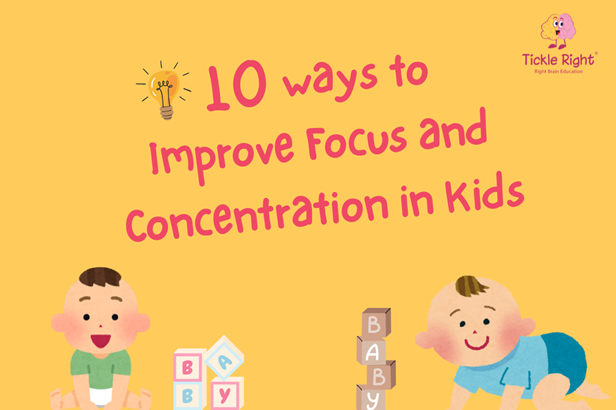10 Proven Ways to Improve Focus and Concentration in Kids
Why Is Concentration So Important for Kids?
In a world filled with constant distractions, screens, notifications, and busy schedules, focus has become a rare skill. For children, the ability to concentrate affects everything: learning, listening, memory, and emotional control. When focus is weak, even simple tasks can feel overwhelming.
That’s why helping your child strengthen this skill early makes a lifelong difference. If you’ve been wondering how to improve focus and concentration in kids, here are 10 proven, practical ways you can start today.
1. Create a Distraction-Free Environment
Children absorb everything around them, sounds, visuals, and even the energy in a space. A calm, clutter-free environment helps them stay centered and attentive.
Try setting up a small, dedicated “focus corner” at home, free of toys, gadgets, or unnecessary items. Use soft lighting, comfortable seating, and minimal background noise.
Tip: Keep only essentials like notebooks, crayons, and a bottle of water nearby.
Learn more about creating child-friendly learning environments that boost concentration.
2. Build a Consistent Daily Routine
A predictable structure gives children a sense of security; they know what’s coming next, which reduces restlessness and boosts focus.
Design a simple daily rhythm that includes dedicated times for meals, study, play, and sleep. Over time, this consistency helps your child’s brain automatically shift into “focus mode” when needed.
Sample Routine:
7:30 AM – Breakfast & school prep
8:30 AM – School hours
4:30 PM – Playtime or outdoor activity
6:00 PM – Quiet study or reading time
8:30 PM – Bedtime routine
Check out how routines and brain structure connect in the first 7 years.
3. Introduce Short, Focused Study Sessions
Children’s attention spans are naturally shorter than adults’. Instead of expecting long stretches of focus, break study time into short, high-energy sessions.
Use the Pomodoro technique for kids, 20 minutes of focused work followed by a 5-minute break. These intervals help prevent mental fatigue and improve retention.
Try using playful breaks, coloring, stretching, or fun indoor activities to reset their energy.
4. Encourage Regular Physical Activity

Movement supports brain function. Exercise increases oxygen flow to the brain, which helps improve alertness, memory, and decision-making.
Encourage at least 30–60 minutes of physical activity daily, whether it’s outdoor play, swimming, cycling, or dancing.
Activities That Help Focus:
- Yoga poses like Tree Pose or Butterfly
- Ball games and cycling
- Nature walks and skipping
Find more ideas for motor skill development through play.
5. Practice Mindfulness and Breathing Exercises
Mindfulness isn’t just for adults; kids can benefit too. It helps them calm their thoughts and bring their attention back to the present.
Try This:
Ask your child to take a few deep breaths before studying. Inhale for 4 counts, hold for 2, and exhale for 4. This simple practice helps reset the mind and improve attention span.
Even 2–3 minutes a day can make a big difference in emotional regulation and focus. Read more about emotional intelligence and mindfulness in children.
6. Add Focus-Boosting Foods to Their Diet
The brain needs fuel to function at its best. Nutrient-rich foods can improve energy levels, attention span, and memory.
Brain Foods That Help Kids Focus:
- Fatty fish (salmon, tuna): rich in omega-3s for memory
- Eggs: contain choline, essential for brain development
- Leafy greens: boost overall brain function
- Berries and oranges: full of antioxidants for sharper focus
- Nuts and seeds: great for sustained energy
Snack ideas like yogurt with walnuts or whole-grain sandwiches can be easy wins. Explore essential nutrients for baby brain development.
7. Limit Screen Time and Encourage Offline Play
Too much screen exposure overstimulates the brain, making it harder to focus later. Encourage your child to take screen breaks, especially before bedtime, and replace screen time with real-world play.
Activities like building blocks, storytelling, painting, or reading engage the imagination and strengthen focus naturally. Discover more benefits of storytelling for preschoolers.
8. Introduce Educational Games That Improve Focus
Learning through play is one of the most effective ways to build attention. Games that involve memory, strategy, and logic challenge the brain to stay alert while keeping it fun.
Focus-Enhancing Games:
- Memory match cards
- Board games like chess or Connect 4
- Sudoku and jigsaw puzzles
- Brain-training apps like Elevate or Lumosity
See how play-based learning helps build attention and problem-solving in kids.
9. Ensure Adequate Sleep and Rest
Sleep directly impacts how well a child can focus, learn, and remember. Without enough rest, even the most engaging activity becomes a struggle.
Recommended Sleep:
- Toddlers (1–3 years): 11–14 hours
- Preschoolers (3–5 years): 10–13 hours
- School-age kids (6–13 years): 9–11 hours.
Create a bedtime routine that includes winding down, dim lights, soft music, and no screens 30 minutes before bed.
Read why structure and predictability improve children’s emotional balance.
10. Set Clear Goals and Reward Effort
Children respond positively to encouragement. Set small, achievable goals and praise their effort rather than perfection.
Example:
“Let’s finish reading one story today.”
When they meet their goal, acknowledge it with words, stickers, or extra playtime.
Positive reinforcement strengthens motivation and builds discipline over time. Learn how confidence and independence develop through small successes.
Bonus Tip: Work Together with Teachers and Counselors
Every child’s focus pattern is different. Teachers and school counselors can share helpful insights about attention patterns, classroom behavior, and learning preferences.
If your child consistently struggles to concentrate, seek guidance from an expert, early intervention can make a big difference.
Conclusion: Building Focus Is a Journey, Not a Sprint
Improving focus and concentration in kids isn’t about quick fixes, it’s about building healthy habits that grow with them.
A balanced routine, nourishing food, limited screen time, and a supportive environment can do wonders. Stay patient and consistent. Every small improvement adds up, and over time, you’ll see your child thrive both in the classroom and beyond.
Want to learn more? Read how holistic child development connects focus, creativity, and emotional well-being.
FAQs
Q1. How can I improve my child’s concentration naturally?
Through a mix of structured routines, healthy meals, regular play, and mindfulness practices.
Q2. What are the best concentration exercises for students?
Breathing exercises, puzzles, and educational games that improve focus.
Q3. How does diet affect concentration?
Nutrients like omega-3s, iron, and B vitamins support better focus and brain performance.
Q4. Does play really help attention span?
Yes — play-based learning improves memory, creativity, and focus.
Q5. Can too much screen time reduce focus?
Absolutely. Screen overuse can harm fine motor skills and attention levels.
Q6. What if my child struggles to stay focused despite these steps?
Consult a teacher or early education expert to identify underlying challenges and create personalized strategies.

